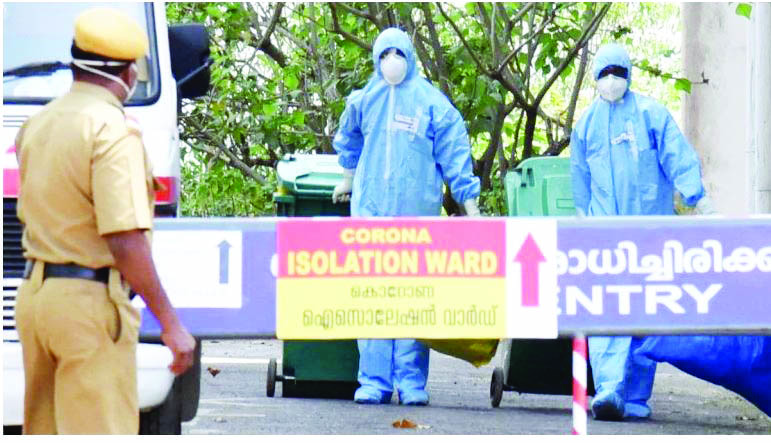STRICT: Kerala has maintained control over the spread of coronavirus by its affective screening and treatment of victims promptly
BY Jeemon Jacob
Behind the success is widespread vigilance and home-quarantining programs started well in time and pursued with determination
From the signs of it, Kerala appears to have the battle against novel Coronavirus (nCoV) in its grip, mounting widespread vigilance against the infection and successfully preventing casualties. An early action plan, constant vigil, dedicated teamwork and political determination have helped the state contain the deadly virus and ensure awareness among the people.
Data as on February 10 says the authorities have put 3,252 people under watch and quarantined in their homes another 3,218 people who either returned from regions affected by nCoV or had come in contact with people potentially exposed to the virus. Thirty four people are being kept in isolation wards in hospitals across the state.
The health department sent 345 samples to the National Institute of Virology units in Pune and Alappuzha, of which 326 tested negative. Swab tests were conducted on 15 people who returned on February 7 from Wuhan, the epicentre of nCoV where more than 900 people have succumbed to the infection. While the swab tests turned out to be negative, the persons were advised to remain home-quarantined for another 28 days to cover the incubation period.
The situation is very much under control now and there is no reason for panic. We have successfully contained nCoV, but will continue our vigil for a few more weeks, state health minister K.K. Shailaja Teacher told INDIA TODAY. Kerala has so far reported three nCoV cases. The first person who tested positive for nCoV tested negative in a subsequent test, said the health minister. Two other persons who tested positive are stable and recovering fast.
Kerala’s last major health scare was the Nipah virus attack in July 2018, which claimed 17 lives. Putting to practice the lessons learnt from that outbreak, the state health department has been strictly following the WHO protocol against nCoV. Since no medicine was available for treating nCoV, our priority was prevention through high-level surveillance. We also opted for home-quarantining of people returning from infected countries and setting up isolation wards across the state, said Dr Rajan N. Khobragade, principal secretary, state health department.
The health department set up a high-level team of experts and healthcare professionals soon after the coronavirus alert. Control rooms were opened in every district and linked to the main control room. We did everything without creating panic and briefed the media about the situation on a daily basis, says Khobragade.
The state used early surveillance and backtracking methods to identify persons who were likely to be exposed to the virus or had come in contact with people returning from regions infected by nCoV. The health department issued a training protocol for healthcare professionals, which was completed after the first case was reported. We had anticipated more cases from Kerala as students and those employed in China visit the state during the Chinese New Year week. Our first priority was to restrict high-risk people and screen them, says a top state health official.
The first nCoV case was that of a medico returning to Thrissur from Wuhan on January 24 via Kolkata. The second case was reported from Alappuzha and the third from Kanhangad in Kasargod district. After the third case, the state government notified the virus outbreak as a state disaster’. Kerala set up isolation wards in all medical colleges, district hospitals and general hospitals and issued a treatment protocol against nCoV. We have taken all precautions to contain the virus and appealed to those in the high-risk category to remain home for 28 days. Most people cooperated and their support has helped us tide over the crisis, minister Shailaja said.
The health department also deployed a 143-member team to offer counselling and is keeping regular touch with people who were quarantined. Lauding the public cooperation, a senior medical officer in Thrissur said: Most people understood the risks and obliged. Even marriages were postponed. In Thrissur, a family held a marriage reception without the bridegroom as he had returned from China after the outbreak of nCoV. However, he has shown no symptoms of the infection. There have been a few exceptions, though. Like a couple under surveillance in Kozhikode who travelled to Saudi Arabia without informing the state health department. Another person under watch decided to attend a spiritual retreat during the incubation period. But district officials identified the person and persuaded him to return home.
Our unity and dedicated service have helped Kerala fight coronavirus effectively. But we need to ensure that we do not drop our guard as yet, says the health minister
Courtersy: India Today
